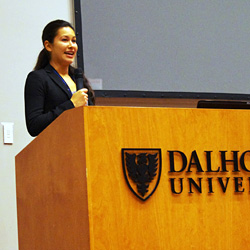The following piece was prepared by students in Dal's .
(June 8) is a time to think about the issues facing our global oceans and to take collective action towards meaningful ways of addressing these problems.
However, current issues in oceans management are diverse and complex, and there is a tendency to focus solely on specific issues without recognizing their interconnectedness. This has often created cross-sector conflicts, which in turn become a barrier to constructive dialogue and action to support sustainable ocean management.
As future ocean management leaders, we, the 2012-2013 students of the Marine Affairs Program (MAP) at 黄色直播, believe that individuals from all sectors must come together to collaboratively provide a strong voice to support innovative solutions for addressing ocean management issues in Canada.
Encouraging dialogue
In April 2013, we hosted the Sobey Fund for Oceans Sustainable Oceans' 2013: Building Bridges in Oceans Management conference. The intention was to provide both a medium for exploring cross-sector dialogue and an opportunity for students to present and discuss their research in a safe and enabling learning space.
 Our keynote speaker, Sarika Cullis-Suzuki, while courageously highlighting the grim realities of the damage we have done to our global oceans, also spoke of opportunities for positive change through collective action and honest communication at the global, national and community levels. Our cross-sector panel brought the discussion closer to home by drawing on personal experiences to further explore Sarika鈥檚 opening remarks. It featured Jarrett Corke (conservation videographer), Iain Archibald (Surfing Association of Nova Scotia), Maxine Westhead (Department of Fisheries and Oceans), Christine Penney (Clearwater Inc.), Tyler Eddy (黄色直播 Department of Biology) and Jessica MacIntosh (MAP student).
Our keynote speaker, Sarika Cullis-Suzuki, while courageously highlighting the grim realities of the damage we have done to our global oceans, also spoke of opportunities for positive change through collective action and honest communication at the global, national and community levels. Our cross-sector panel brought the discussion closer to home by drawing on personal experiences to further explore Sarika鈥檚 opening remarks. It featured Jarrett Corke (conservation videographer), Iain Archibald (Surfing Association of Nova Scotia), Maxine Westhead (Department of Fisheries and Oceans), Christine Penney (Clearwater Inc.), Tyler Eddy (黄色直播 Department of Biology) and Jessica MacIntosh (MAP student).
We heard that personal values, trust, honesty, willingness and respect are fundamental elements that underpin meaningful dialogue and effective communication. Many also cautioned, however, that not all successes take place overnight and that meaningful collaborative action can often be stifled by greed, negative attitudes and an unwillingness to hear and understand the views of others.
Shaping an oceans community
During the two-day conference there were many inspiring stories shared and innovative presentations discussed, including the important role that communities can play in making our oceans sustainable. But who exactly is the community?
For some, the community is represented by fishermen, coastal citizens and industries that depend upon the oceans for their daily livelihoods. For others, community is reflected by those to whom the oceans bring a sense of joy and inspiration, be it through surfing, diving or artistic expressions, such as the many local artists who displayed their work during the conference. Yet for others still, being part of the community involves聽 management responsibility and/or a never-ending search to learn more about the mysteries of the deep blue and shallow greens that cover more than 70 per cent of our planet. Perhaps some of us see our interests reflected in all of the above.
Is it possible that we are all part of the oceans community?
For the students of the MAP who had the privilege of hosting this year鈥檚 conference, the oceans community was reflected by the government employees, industry representatives, local citizens, scientists, and students who generously gave up their time to participate and share their experiences and aspirations towards building bridges for sustainable oceans management. Our conference was just one event and just one of the many opportunities to further this dialogue.
Undoubtedly, there is still a need and great opportunity to provide new and creative platforms for collaboration that embrace and encourage the diversity of the oceans community. What the Sustainable Oceans Conference highlighted is that we have, within our reach, the common building blocks for collective action and honest communication. The 2013 incoming MAP students will continue our efforts in advancing this over the next year.
Redefining our ocean relationship
Ms. Cullis-Suzuki left us with a call to action stating that, 鈥渙ur own beginnings come from the ocean, and our survival hinges on its fate. Yet through overexploitation and misuse we鈥檝e fundamentally altered it. As we confront this new, endangered ocean, we must accept accountability, reflect on our collective responsibility, and redefine our relationship with it."
This World Oceans Day, we invite you to take the time to reflect on what sustainable oceans means to you. No matter which aspect of the community you feel most aligned with, remember that we all play a part in forwarding effective collective action, as we are all one of the same ocean鈥檚 community. 聽
Happy World Oceans Day!

Marine Affairs Program, 2013.

